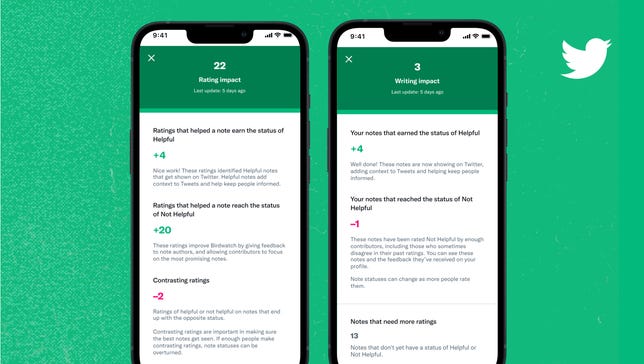What’s happening
Twitter continues to expand its crowdsourced fact-checking project.
Why it matters
Misinformation is a big concern ahead of the US midterm elections in November.
Twitter wants to grow the amount of people who participate in its crowdsourced fact-checking project Birdwatch ahead of the US midterm elections in November.
The social media platform has roughly 15,000 people who rate and write “notes” on potentially misleading tweets as part of Birdwatch. Twitter expects to add about 1,000 more contributors to Birdwatch every week. The company also said that later this week, 50% of people in the US will see tweets with notes that have been rated helpful on their timelines.


Twitter is rolling out a new onboarding process for Birdwatch.
TwitterThe expansion of Twitter’s fact-checking experiment comes as social media platforms try to improve how they’re combating online lies. Social media companies are relying heavily on strategies they used in previous elections such as labeling posts, fact-checking and elevating authoritative information to help curb the spread of political misinformation. But they’ve also facing pressure from civil rights groups and voting rights experts to do more to fight an ongoing problem.
Twitter, like Facebook’s parent company Meta, has also been accused of prioritizing growth over the safety of its 238 million daily users. Twitter’s former head of security, Peiter Zatko, who was fired from the company, filed a whistleblower complaint against Twitter in July. Twitter pushed back against the allegations and said privacy and security are top priorities. Over the weekend, The Washington Post also reported that experts raised concerns that conspiracy theorists could exploit Birdwatch weeks before the program launched in 2021.
As Twitter looks to grow Birdwatch, the company said it’s trying to keep a close eye on the quality of notes contributors write on tweets. Keith Coleman, Twitter’s vice president of product, said the company has been reminding Birdwatch contributors to cite their sources and works with news outlets such as the Associated Press and Reuters that review the accuracy of the notes.
One of the benefits of Birdwatch, he said, is it helps Twitter address content that could be misleading but doesn’t violate the company’s rules against COVID misinformation, manipulated media and civic integrity. For example, a tweet could leave out an important detail.
“It can cover any gray area, and ultimately it’s up to the people to decide whether the context is helpful enough to be added,” Coleman said during a virtual press conference.
The company has seen some positive results from the project. People are 15% to 35% less likely to like or retweet a tweet when there’s a note from the Birdwatch project on it. Through surveys, Twitter also found that people are on average 20% to 40% less likely to agree with a potentially misleading tweet after they’ve read the note about it.
There are downsides to fact-checking efforts social networks have rolled out such as labeling. A 2020 MIT study found that labeling false news could result in users believing stories that hadn’t gotten labels even if they contained misinformation. But research has also shown that crowdsourcing can be helpful in fighting the spread of online lies.
Twitter users also might be wary about trusting the notes they read. Birdwatch contributors use aliases so they can write and rate notes without revealing their identity. Twitter said anonymity could help people feel more comfortable writing notes without fear of harassment.
To help improve the quality of fact-checking, Twitter is also rolling out a new onboarding process for Birdwatch contributors. Contributors will earn points for helping a note reach a rating of helpful or not helpful and need to have a “rating impact” score of five before they can write notes on tweets. Contributors will lose points if their ratings don’t appear to be accurate.
Birdwatch contributors will also receive a separate score for whether the notes they write are rated helpful or unhelpful. They’ll receive feedback about why their notes are unhelpful like they include typos, use unclear language or don’t cite a source. If a contributor’s writing impact score is too low, they’ll be temporarily locked out of writing more notes until their score improves.
“We believe that this design can help keep the bad faith actors from spamming Birdwatch while helping the well intentioned contributors reach their maximum impact,” said Lucas Neumann, a senior staff product designer at Twitter.
Twitter users are eligible to contribute to Birdwatch if they have a verified phone number on a trusted US-based phone carrier, joined Twitter at least six months ago and have no recent violations of Twitter’s rules. Users can write notes for tweets in both English and Spanish.
While Twitter employees have focused on the quality of the fact-checking, Coleman said they’re also working on other updates that could help the company tackle the large amount of tweets that flow through the platform every second. Twitter is working on an update that will notify Birdwatch contributors to rate notes on high visibility tweets.
“We don’t think there’s any one-size-fits-all solution to misinformation,” Coleman said. “Birdwatch is additive to the many other things we do.”
